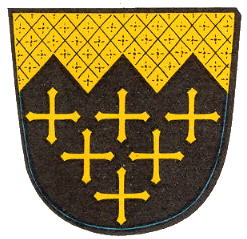Hoch-Weisel: Difference between revisions
Jump to navigation
Jump to search
Knorrepoes (talk | contribs) m (Text replacement - "/Arms of " to "/Arms (crest) of ") |
Knorrepoes (talk | contribs) m (Text replacement - "{{media}}" to " {{de1}} {{media1}}") |
||
| Line 25: | Line 25: | ||
The arms are those of the Lords of Hochweisel, first mentioned in 1231, who had a castle in the village. The family became extinct in 1559. The village had its own court for centuries, but no seal or arms of the court are known, hence the choice of the arms of the medieval lords. | The arms are those of the Lords of Hochweisel, first mentioned in 1231, who had a castle in the village. The family became extinct in 1559. The village had its own court for centuries, but no seal or arms of the court are known, hence the choice of the arms of the medieval lords. | ||
{{ | |||
{{de1}} | |||
{{media1}} | |||
[[Civic Heraldry Literature - Germany|'''Literature''']]: Hessisches Wappenbuch, 1956 | [[Civic Heraldry Literature - Germany|'''Literature''']]: Hessisches Wappenbuch, 1956 | ||
Revision as of 11:50, 26 December 2022
This page is part of the German heraldry portal Deutsche Wappensammlung |
Heraldry of the World |
|
German heraldry:
|
Selected collector's items from Germany:
|
HOCH-WEISEL
State : Hessen
District (Kreis) : Wetteraukreis (until 1975 Friedberg-Hessen)
Incorporated into : 1971 Butzbach
| German |
Unter einem goldenen Schildhaupt in Schwarz mit drei oberen Spitzen sechs (3:2:1) goldene Kreuze. |
| English | No blazon/translation known. Please click here to send your (heraldic !) blazon or translation |
Origin/meaning
The arms were officially granted on September 12, 1956.
The arms are those of the Lords of Hochweisel, first mentioned in 1231, who had a castle in the village. The family became extinct in 1559. The village had its own court for centuries, but no seal or arms of the court are known, hence the choice of the arms of the medieval lords.
Literature: Hessisches Wappenbuch, 1956


